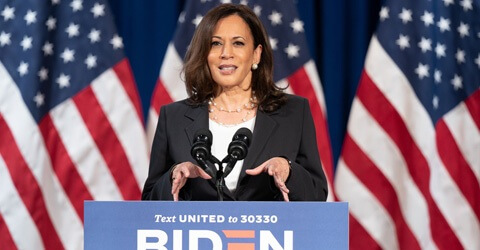Kamala Devi Harris is a distinguished American politician and attorney who is currently the 49th Vice President of the United States. She is the country’s first female Vice President, the highest-ranking female elected official in U.S. history, the first African American and first Asian American Vice President.
A woman with impeccable grace, a penchant for shattering glass ceilings and a deep love for music. Kamala Harris is a woman of many firsts, starting with her position as a county district attorney at the district attorney for San Francisco, she was the first woman and first African-American and Indian-origin to be elected.
“My mother would look at me and she’d say, ‘Kamala, you may be the first to do many things, but make sure you are not the last,'” Harris said during a lecture at Spelman College, recalling the motto that’s guided her life. “That’s why breaking those barriers is worth it. As much as anything else, it is also to create that path for those who will come after us.”
So what’s the story behind this inspiring woman that everyone in the World is watching?
Born to a Jamaican father and an Indian mother, Kamala Harris grew up in Oakland. Her parents got divorced when she was 5. She was raised by her single mother who adopted Oakland’s black culture, immersing her two daughters – Kamala and her younger sister Maya – within it.
“My mother understood very well that she was raising two black daughters,” she wrote in her autobiography The Truths We Hold. “She knew that her adopted homeland would see Maya and me as black girls and she was determined to make sure we would grow into confident, proud black women.”
She completed her college education in the US at Howard University, which she has described as among the most formative experiences of her life.
“I became an adult at Howard University,” Harris told the Washington Post. “Howard very directly influenced and reinforced—equally important—my sense of being and meaning and reasons for being.”
After Howard, she went on to study law at the University of California, Hastings and began her career in the Alameda County District Attorney’s Office.
She soon rose and became the top prosecutor for San Francisco in 2003, before being elected the first woman and the first black person to serve as California’s attorney general in 2010, the top lawyer in America’s most populous state.
In her nearly two terms in office as attorney general, Harris gained a reputation as one of the rising stars of the Democratic Party. She was elected as California’s junior US senator in 2017.
“At every step of the way, I’ve been guided by the words I spoke from the first time I stood in a courtroom: Kamala Harris, For the People,” she said during her vice-presidential acceptance speech at the DNC. “I’ve fought for children, and survivors of sexual assault. I’ve fought against transnational gangs. I took on the biggest banks, and helped take down one of the biggest for-profit colleges. I know a predator when I see one.”
Harris’s book, Smart on Crime (2009; co written with Joan O’C. Hamilton), was considered a model for dealing with the problem of criminal recidivism.
As a senator, Harris supported healthcare reform, citizenship for undocumented immigrants, ban on assault weapons, and progressive tax reforms.
After taking office in January 2017, Harris began serving on both the Select Committee on Intelligence and the Judiciary Committee, among other assignments. She became known for her prosecutorial style of questioning witnesses during hearings. . In June 2017 she drew particular attention for her questions to the U.S. Attorney General Jeff Sessions, who testified before the intelligence committee on alleged Russian interference in the 2016 presidential election. Harris’s memoir, The Truths We Hold: An American Journey, was published in January 2019.
In December 2020, Harris ran for the Democratic nomination for US President. However, she ended her campaign due to lack of funds. Harris, as part of her previous presidential campaign, also released a criminal justice reform plan that seeks to scale back incarceration, end the death penalty and solitary confinement, ban private prisons, and get rid of cash bail.
As racial injustice became a major issue in the United States after the death of George Floyd, many Democrats called on Biden, the party’s nominee, to select an African American woman—a demographic that was seen as vital to his chances at winning the election—as his vice presidential running mate. In August 2020 Biden chose Harris and she became the first Black woman to appear on a major party’s national ticket. In November 2020 she became the first Black woman to be elected vice president of the United States.
Regarding her stance on racial injustice she said, “Let’s speak the truth: People are protesting because Black people have been treated as less than human in America. Because our country has never fully addressed the systemic racism that has plagued our country since its earliest days. It is the duty of every American to fix. No longer can some wait on the sidelines, hoping for incremental change. In times like this, silence is complicity,” she wrote in an op-ed for Cosmopolitan.
Around 1.3 million Indian-Americans are estimated to have voted in this year’s presidential election, according to research firm CRW Strategy.
In her iconic winning speech, she said, “But while I may be the first woman in this office, I won’t be the last. Because every little girl watching tonight sees that this is a country of possibilities. And to the children of our country, regardless of your gender, our country has sent you a clear message: Dream with ambition, lead with conviction, and see yourself in a way that others might not see you, simply because they’ve never seen it before. And we will applaud you every step of the way.”







